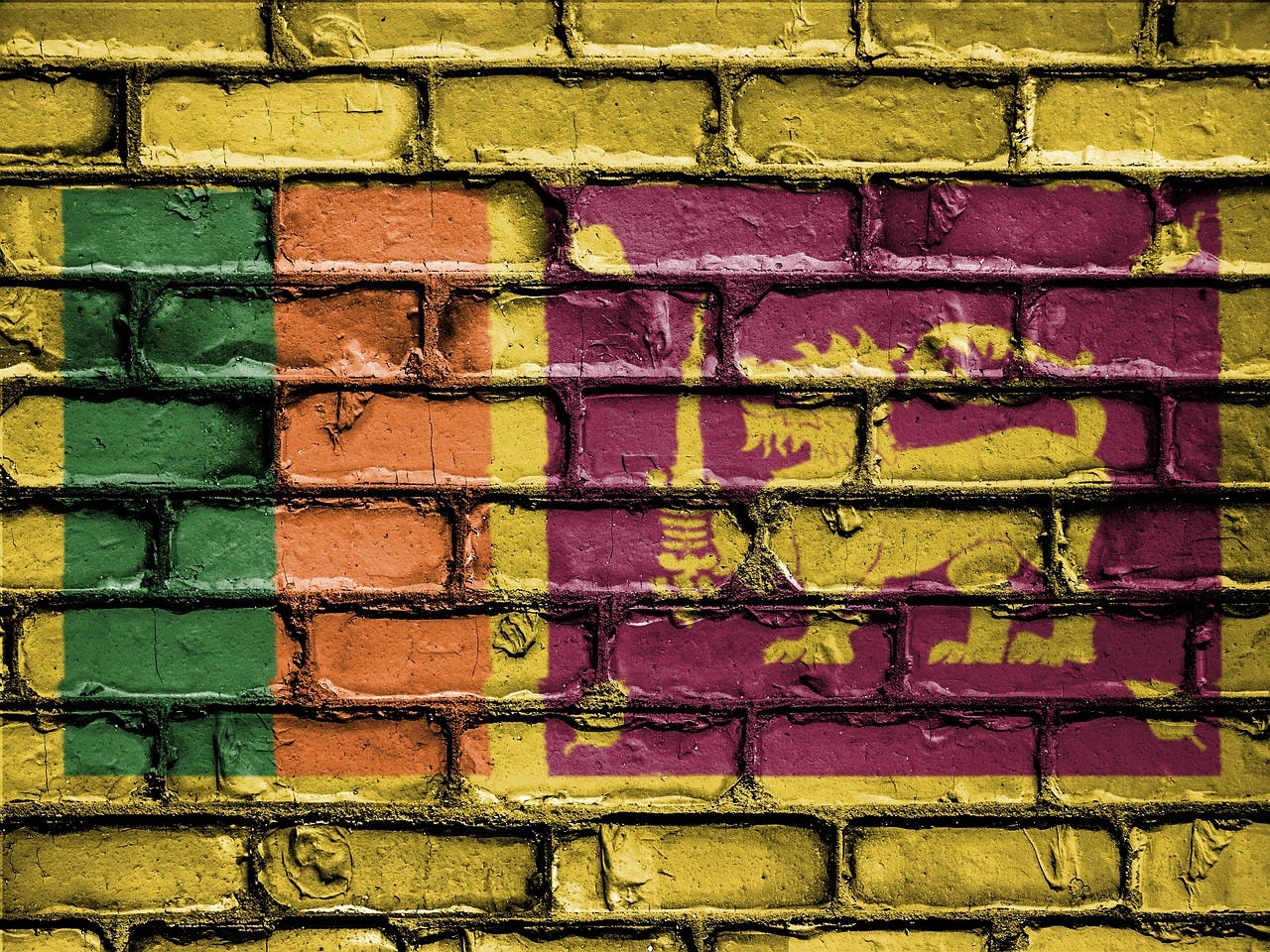How Captain Cool rescued India Cements
Also in today’s edition: Darn that yarn; India’s Lankan loss; Aeroplanes as bribes; Horror is a delight
Good morning! Leave it to Silicon Valley to make money out of anything. The Verge reports that Google Registry, the tech giant’s domain registry service, will soon offer a slew of fun domain names. The list includes .ing and .meme. Seeing the potential (think of a deluge of clickbait-y websites like th.ing or fun.meme), in-demand domain names are retailing for as high as $39,000. Boy, Google sure knows how to get the cash register go kach.ing.
Soumya Gupta and Adarsh Singh also contributed to today’s edition.
We would like to know more about you. Participate in our annual survey by filling up this form. We’ll use your answers to tweak our products and make them more enjoyable for you. As always: you will remain anonymous.
The Market Signal
Stocks & Economy: The US Federal Reserve did not raise interest rates after the meeting of the Federal Open Market Committee this week. Fed chair Jerome Powell also indicated that it might be done with jacking up rates.
The stand, despite wages rising in the second quarter, betrays a certain helplessness at the Fed. The turmoil in the bond markets could become a ruinous spiral if rates go up even more. It will raise borrowing costs for the US government, which needs billions of dollars to fight fires at home and elsewhere in the world.
US equities jumped on the Fed’s decision. So did Asian markets. Japanese stocks were also buoyed by a $113 billion government stimulus package to fight inflation.
The mood could rub off on Indian equities, which have been lacklustre in the past few sessions. The GIFT Nifty indicates a robust opening.
CORPORATE
Why India Cements Should Thank Dhoni
India Cements and its plucky boss N Srinivasan would thank the day they picked MS Dhoni to lead Chennai Super Kings (CSK), their Indian Premier League (IPL) team.
The charismatic former India captain led CSK to five IPL wins and, in the process, turned it into the league’s first unicorn, more valuable than India Cements. Those riches are now rescuing the cash-squeezed parent, which has been gradually ceding market share to bigger northern rivals such as UltraTech and Gujarat Ambuja.
Last year, India Cements borrowed ₹180 crore (~$21.6 million) from CSK to meet repayment obligations. It sold non-core assets too, but the ₹3,000 crore (~$360) million) debt mountain is too high to scale.
That pops a question in our head: would Srinivasan sell a slice of CSK, whose ownership was divided among India Cements shareholders, to raise funds or maybe even sell the cement business?
COMMODITIES
Have You Any Cotton?
Be prepared to lose your shirt trying to buy one next year, and blame the weather for it.
India’s cotton production is set to fall to a 15-year low to 29.51 million bales (each bale is 170 kg) in the 2023-24 marketing season, which began in October and will end next September, according to the Cotton Association of India (CAI). The El Nino weather pattern has shrunk the sown area of cotton by 5.5%, and that is likely to reduce yields by a fifth. Combined with poor harvests in China and Brazil, global production of the fibre is expected to shrink by 3% in the upcoming season.
The CAI production estimate is less than government and international forecasts and will likely impact global prices, especially if Chinese demand revives. Farmers lucky to grow a good crop won’t be complaining, though.
NEIGHBOURHOOD
An Opportunity Missed

In 2019, Silver Park International, the Singapore-based investment vehicle of Chennai-headquartered The Accord Group—alongside Oman’s oil ministry—signed a $3.85 billion deal to build the Hambantota Refinery. It was the largest foreign direct investment in Sri Lanka (SL). At the time, India was on track to become an influential foreign investor there.
But the project attracted controversy after Oman denied any involvement, and a DMK minister was found to have links to Silver Park. It went belly-up. The Hambantota Refinery is now in the lap of Chinese state-owned oil and gas major Sinopec after Vitol, the only other bidder interested in restarting the project, backed out.
Why this matters: India was poised to make strategic inroads in Sri Lanka after the collapse of the Rajapaksa regime, which had enabled China’s debt trap diplomacy. Sinopec has been eyeing Hambantota since 2019. It got what it wanted.
The Signal
The development follows China’s tentative agreement to restructure SL’s debt. India-SL ties are also affected by pain points such as licences for Indian fishermen and a contentious Adani energy project. Meanwhile, Chinese tech giant Huawei has made major inroads in SL.
Beijing’s reputation as a predatory lender hasn’t dented its progress in the subcontinent. Its Belt and Road Initiative has given Nepal airports and Bangladesh its largest infrastructure project.
For all its overtures, New Delhi hasn’t been successful in presenting itself as a viable alternative to Beijing. Even Bhutan recently held unprecedented boundary talks with China. And these are two countries with no diplomatic relations.
AVIATION
Caution: Turbulence Ahead
India’s aviation regulator is in a hot mess. The Association of Flying Training Organisations is seeking a probe into the workings of Anil Gill, director of the Flying and Training Division at the Directorate General of Civil Aviation (DGCA). The association claims Gill abused his position for personal gains.
The allegations claim that three aircraft were accepted as bribes from flying schools, then leased to other schools for favourable audits at ₹90 lakh ($105,000) a month each. Worse, India's largest flying school, Redbird Aviation, reported five engine failure incidents, underscoring the potential impact of this collusion. The DGCA has initiated a preliminary inquiry, while Gill asserts his innocence.
In other news: DGCA’s handling of the infamous Air India urination case is turning thorny. And the Enforcement Directorate has seized Jet Airways’ properties worth more than ₹500 crore as part of a money laundering investigation against the bankrupt airline.
ENTERTAINMENT
‘It’ (Makes Money)
We’re talking about horror movies. Warner Bros’ 2017 film It, based on Stephen King’s novel, is the most lucrative horror film ever, earning $700 million. Six years on, horror films are keeping Hollywood’s cash registers ringing. The latest surprise hit is the mid-budget film Five Nights at Freddy’s.
The (box office is) Shining: Horror films are a better investment than other genres because they tend to have smaller budgets and don’t need to be blockbusters to make a profit. Of the 50 most profitable films ever, 16 are horror. That includes Paranormal Activity, the breakout hit that put Blumhouse Productions on the map. Blumhouse and A24 Films have become formidable production houses by consistently delivering horror hits.
Lean library: Meanwhile, Apple TV is changing strategy, testing originals at the box office before releasing them online. Will this help it scale up? Maybe not: Apple’s content library is far smaller than rivals’.
🎧 Why horror is a golden genre at the box office. Also in today’s edition: quirky domain names are all the rage. Listen to The Signal Daily on Spotify, Apple Podcasts, Amazon Music, Google Podcasts, or wherever you get your podcasts.
FYI
😷: Air pollution increases the risk of Type 2 diabetes, according to a seven-year study featuring 12,000 residents of Delhi and Chennai.
Dragged: Apple has lost a bid to block a UK mass action lawsuit, filed on behalf of 24 million iPhone users, that alleges the company concealed battery defects. The suit is seeking ~$2 billion in damages.
Almost there: The Reserve Bank of India has received more than 97% of the ₹2,000 notes after withdrawing the denomination from circulation in May. Notes worth ₹10,000 crore (~$1.2 billion) are still with the public.
Better efficiency: Tata Consumer Products plans to merge three wholly-owned subsidiaries NourishCo Beverages, Tata SmartFoodz, and Tata Consumer Soulfull.
Neighbourhood first: Indian Prime Minister Narendra Modi and Bangladesh Premier Sheikh Hasina virtually inaugurated the Agartala-Akhaura cross-border rail link, crucial for connectivity in the Northeast region.
Toodles: Unacademy’s chief financial officer Subramanian Ramachandran has resigned, marking the third big exit from the edtech company in two months.
Ka-ching!: Health-tech startup Sugar.fit has raised $11 million in a Series A round led by venture capital firm Mass Mutual Ventures.
THE DAILY DIGIT
168,491
The number of people who died in road accidents in India in 2022, an all-time high. The year marked a 9.4% increase in fatalities compared with 2021, according to data from the Ministry of Road Transport and Highways. (Business Standard)
FWIW
Another one: Nvm the social media saturation, a new platform named Lapse has entered the chat. It encourages people to take pictures the way they did in the analog days. Meaning, users snap photos and “develop” them in the app for hours. Once it’s ready, they can take a call on sharing it with their friends or archiving it for personal use. The photos can only be taken through its app, and there’s no scope for editing. By riding on the nostalgia wave, Lapse hopes to create a lasting impression among its users. For now, the trick seems to be working as it shot to No. 2 in the United States on the Apple App Store.
Alternate reality: Recording bullying videos for TikTok, dance videos in the loos, scrolling in the middle of class… these are just some of the problems teachers in Florida schools are dealing with. With no solution in sight, the state imposed a ban on cell phones during class. Some schools took things further and banned phones on campuses. The result? A drop in bullying and just normal human behaviour all around. Students now make eye contact and respond to greetings. Some teachers have even reported an improvement in student communication and collaboration skills. Sounds miraculous to us.
Tr-AI-ning sets: Researchers at the Royal Marsden Hospital have made significant advancements in utilising AI for cancer detection. In a study published in Lancet Oncology, they detailed their use of radionics to spot indications in scans from 170 patients. This data enabled the AI algorithm to accurately grade the aggressiveness of 89 tumours, surpassing biopsy results. Notably, the model not only enhanced accuracy, but also improved diagnosis compared to conventional methods. These findings have ignited enthusiasm among researchers for AI's potential in cancer management.








